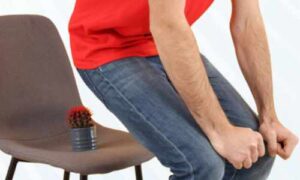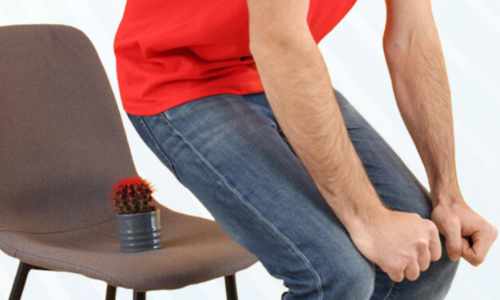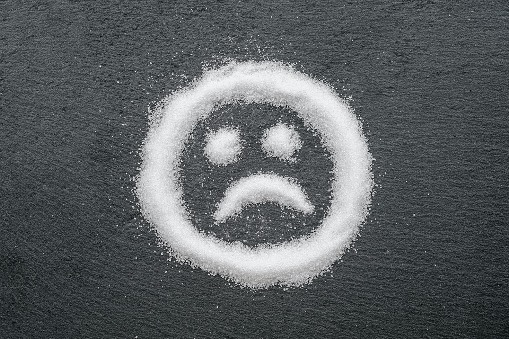FISSURE OVERVIEW
SYMPTOMS OF FISSURE
These symptoms collectively characterize anal fissures, prompting individuals to seek medical evaluation and appropriate intervention for relief and healing. Common symptoms of anal fissures include:
Sharp Pain or Discomfort: Individuals with anal fissures commonly experience sharp pain or discomfort during and after bowel movements. The pain can be severe and may persist for a variable duration.
Bleeding: Anal fissures often result in bleeding during or after defecation. The blood is typically bright red and may be observed on toilet paper or in the toilet bowl.
Persistent Pain: The pain associated with anal fissures can extend beyond bowel movements, causing ongoing discomfort throughout the day. This persistent pain may impact daily activities.
Itching: Some individuals with anal fissures may also experience itching in the anal area, contributing to overall discomfort.
Tenderness: The affected area around the anal opening may become tender to the touch due to the presence of the fissure.
Spasms of the Anal Sphincter: In response to the fissure, there may be spasms of the anal sphincter muscles, which can contribute to pain and difficulty in relaxing the muscles.
Visible Tear: In some cases, a visible tear or crack in the skin around the anal opening may be noticed upon close inspection.
Discomfort Between Bowel Movements: Individuals may continue to experience discomfort between bowel movements, impacting their overall quality of life.
CAUSES OF FISSURE
Understanding and addressing the underlying causes of Fissure are crucial in the effective management and prevention of anal fissures. Individuals experiencing symptoms or at risk should seek medical evaluation for appropriate diagnosis and intervention. The causes of anal fissures are typically related to factors that contribute to increased pressure or trauma in the anal canal. Common causes include:
Straining During Bowel Movements: Excessive straining while passing stools, often due to constipation or hard stools, can lead to the development of anal fissures.
Constipation: Chronic constipation, where stools are hard and difficult to pass, increases the risk of anal fissures. Straining during bowel movements can result in tears in the anal lining.
Diarrhea: While less common, frequent episodes of diarrhea can also irritate and damage the delicate tissues of the anal canal, leading to the formation of fissures.
Low-Fiber Diet: Inadequate fiber intake can contribute to constipation, leading to harder stools that are more challenging to pass and potentially causing anal fissures.
Anal Trauma: Trauma to the anal region, such as injury during childbirth or engaging in anal intercourse, may cause fissures.
Inflammatory Bowel Diseases (IBD): Conditions like Crohn’s disease or ulcerative colitis, which cause inflammation in the gastrointestinal tract, can increase the risk of anal fissures.
Anal Infections: Infections in the anal area can contribute to the development of fissures.
Spasms of the Anal Sphincter: Abnormal spasms of the anal sphincter muscles can prevent the fissure from healing properly, prolonging the condition.
Underlying Medical Conditions: Certain medical conditions, such as diabetes, that affect blood flow and tissue healing may contribute to the development or persistence of anal fissures.
PREVENTION OF FISSURE
By incorporating certian preventive measures into your daily routine, you can significantly reduce the risk of developing anal fissures and promote overall anal health. If you experience persistent symptoms or have specific health concerns, consult with a healthcare professional for personalized guidance and advice. To prevent anal fissures, consider adopting the following measures:
High-Fiber Diet: Include plenty of fiber-rich foods in your diet, such as fruits, vegetables, whole grains, and legumes. Fiber promotes regular bowel movements and helps prevent constipation.
Adequate Hydration: Drink enough water throughout the day to keep your stools soft and easy to pass. Staying well-hydrated supports overall digestive health.
Regular Exercise: Engage in regular physical activity to promote bowel regularity and prevent constipation. Exercise helps keep the digestive system functioning optimally.
Avoid Straining: When having a bowel movement, avoid excessive straining. Take your time on the toilet and allow stools to pass naturally.
Establish Good Toilet Habits: Develop a routine for regular bowel movements and avoid delaying when you feel the urge. Use a comfortable toilet seat and maintain good posture.
Gentle Anal Care: After bowel movements, practice gentle anal hygiene using mild, unscented wipes or water. Avoid harsh or scented products that may irritate the anal area.
Warm Baths: Take warm baths, especially after bowel movements. This can help relax the anal muscles and provide soothing relief.
Topical Lubricants: If engaging in anal intercourse, use water-based lubricants to reduce friction and minimize the risk of trauma to the anal area.
Manage Underlying Conditions: Effectively manage any underlying health conditions, such as inflammatory bowel disease or diabetes, as they can contribute to the development of anal fissures.
Regular Check-ups: If you have a history of anal fissures or ongoing concerns, schedule regular check-ups with your healthcare provider to monitor and address any potential issues.
DIAGNOSIS FOR FISSURE
Prompt medical attention is essential if you experience symptoms of an anal fissure. Diagnosing the condition accurately allows for timely intervention and management. Always consult with a healthcare professional for personalized advice and treatment tailored to your specific health needs. The diagnosis of anal fissures typically involves a combination of a medical history review, physical examination, and, in some cases, additional procedures. Here’s an overview of the diagnostic process:
Medical History:
The healthcare provider will inquire about your symptoms, including details about pain, bleeding, and discomfort during bowel movements. Information about your bowel habits, diet, and any underlying health conditions will be gathered.
Physical Examination:
A physical examination of the anal area will be conducted. This may involve gently inspecting the area for signs of fissures, swelling, or other abnormalities. The healthcare provider may use a gloved finger for a digital rectal examination to assess the condition of the anal canal.
Anoscopy: Anoscopy is a procedure where a small, tubular instrument called an anoscope is inserted into the anus to provide a closer view of the anal canal. This allows for a more detailed examination of the fissure, its location, and any associated abnormalities.
Stool Examination: In some cases, a stool sample may be examined to rule out infections or other gastrointestinal issues that could be contributing to symptoms.
Colonoscopy (if needed): In situations where there is suspicion of underlying conditions such as inflammatory bowel disease, a colonoscopy may be recommended to examine the entire colon.
Biopsy (if necessary): In rare cases, if there are concerns about other conditions, a biopsy may be performed during a colonoscopy to obtain a tissue sample for further analysis.
Consultation:
Based on the findings, the healthcare provider will discuss the diagnosis, provide information about the severity of the fissure, and recommend an appropriate treatment plan.
FISSURE MANAGEMENT THROUGH ALLOPATHY
In allopathy, the management of anal fissures involves a multi-faceted approach to alleviate symptoms, promote healing, and prevent recurrence. Here’s an overview of fissure management through allopathic interventions:
Topical Medications:
Topical Anesthetics: Creams or ointments containing local anesthetics help alleviate pain and discomfort.
Nitroglycerin Creams: These creams help relax the anal sphincter muscles, improving blood flow and promoting healing.
Stool Softeners and Fiber Supplements:
Prescribed medications or over-the-counter stool softeners and fiber supplements help prevent constipation, ensuring softer stools and reducing strain during bowel movements.
Pain Relief Medications:
Non-steroidal anti-inflammatory drugs (NSAIDs) or acetaminophen may be recommended to manage pain and inflammation associated with anal fissures.
Botulinum Toxin Injections:
In some cases, injections of botulinum toxin into the anal sphincter may be considered to relax the muscles and promote healing.
Lateral Internal Sphincterotomy:
A surgical procedure where a small portion of the anal sphincter muscle is cut to reduce pressure, allowing better blood flow and facilitating healing.
Fibrin Glue Injections:
This procedure involves injecting fibrin glue into the fissure to seal it and promote healing.
Advancement Flap Surgery:
In cases where other interventions are unsuccessful, surgical procedures like advancement flap repair may be performed to promote healing and prevent recurrence.
Follow-up Care:
Regular follow-up appointments with healthcare providers are crucial to monitor the healing process, adjust medications, and address any complications.
Lifestyle and Dietary Recommendations:
Advising patients on lifestyle changes, such as maintaining good anal hygiene, avoiding excessive straining, and adopting a high-fiber diet, is an integral part of fissure management.
FISSURE MANAGEMENT THROUGH AYURVEDA
In Ayurveda, the management of anal fissures focuses on a holistic approach, including dietary and lifestyle modifications, herbal remedies, and specific therapies. Ayurvedic management of anal fissures aims to balance the body’s doshas (energies), promote natural healing, and address the root causes. It is crucial to consult with a qualified Ayurvedic practitioner for personalized guidance and a treatment plan tailored to individual health needs. Additionally, individuals may choose an integrative approach, combining Ayurvedic and allopathic treatments under professional supervision for comprehensive care. Here’s an overview of fissure management through Ayurveda:
Dietary and Lifestyle Modifications:
High-Fiber Diet: Emphasizing a diet rich in fiber helps regulate bowel movements and prevents constipation, contributing to the healing process.
Adequate Hydration: Ensuring proper hydration is crucial for maintaining soft stools and supporting overall digestive health.
Regular Exercise: Engaging in regular physical activity promotes healthy digestion and contributes to bowel regularity.
Herbal Remedies:
Triphala: A herbal formulation combining three fruits (amla, haritaki, and bibhitaki), Triphala is known for its gentle laxative effects, helping in maintaining regular bowel movements.
Aloe Vera: The soothing properties of Aloe Vera can aid in reducing inflammation and promoting healing.
Guggul: This resin from the Commiphora wightii tree is believed to have anti-inflammatory properties and is used in Ayurveda for various digestive issues.
Kshara Sutra Therapy:
Kshara Sutra: A specialized Ayurvedic procedure involving the use of a medicated thread (kshara sutra) to gently cut and heal the fissure. This procedure is often recommended for chronic cases.
Lifestyle Guidance:
Yoga and Pranayama: Specific yoga postures and breathing exercises can help improve digestion and reduce stress, contributing to overall well-being.
Stress Management: Stress can exacerbate digestive issues. Ayurveda emphasizes stress reduction through practices like meditation and mindfulness.
Tailored Ayurvedic Formulations:
Tailor-Made Medicines: Ayurvedic practitioners may prescribe specific herbal formulations based on an individual’s constitution and the nature of the fissure.
Follow-up and Monitoring:
Regular Consultations: Periodic follow-up consultations with an Ayurvedic practitioner are essential to assess progress, adjust treatments, and address any emerging concerns.
FISSURE MANAGEMENT BY PANCHKARMA
The management of anal fissures through Panchakarma involves specific treatments aimed at balancing the body’s doshas (energies) and promoting natural healing. Panchakarma aims to address the root causes of anal fissures, providing a holistic approach to healing. It is essential to consult with a qualified Ayurvedic practitioner who can tailor the Panchakarma treatments based on individual health needs. Additionally, individuals may opt for an integrative approach, combining Ayurvedic and allopathic treatments under professional supervision for comprehensive care. Here’s an overview:
Virechana (Therapeutic Purgation):
Purpose: To eliminate excess Pitta dosha and toxins from the body.
Procedure: Involves the administration of medicated purgatives to induce controlled bowel movements, promoting detoxification.
Basti (Medicated Enema):
Purpose: Balancing Vata dosha and nourishing the colon.
Procedure: Medicated enemas containing herbal decoctions, oils, or ghee are administered to cleanse and rejuvenate the colon.
Kshara Sutra Therapy:
Purpose: For chronic cases of anal fissures.
Procedure: Involves the use of a medicated thread (kshara sutra) to cut and heal the fissure, promoting tissue regeneration.
FISSURE MANAGEMENT BY DR MONGA MEDI CLINIC
At Dr Monga Medi Clinic, we seamlessly combine both Ayurvedic and allopathic approaches, holds the potential to provide comprehensive and well-rounded care for the management of anal fissures. Our treatment begins with a comprehensive assessment where a team of practitioners from both systems evaluates the patient’s medical history, symptoms, and physical condition. This collaborative diagnostic approach utilizes the strengths of both allopathic and Ayurvedic tools to gain a thorough understanding of the fissure, contributing factors, and the overall health status of the patient.
In the development of a holistic treatment plan, we draw upon the strengths of allopathic interventions for immediate symptom relief. Allopathic measures may include the prescription of topical medications like anesthetics and nitroglycerin creams for pain relief, along with stool softeners and fiber supplements to manage constipation. Simultaneously, our Ayurvedic interventions are integrated into the treatment plan, incorporating Panchakarma therapies such as Basti, Virechan for detoxification and healing. Ayurvedic herbal formulations, including Triphala, Aloe Vera, and Guggul, are prescribed to support digestion, reduce inflammation, and enhance overall well-being.
For collaborative procedures such as Kshara Sutra therapy, where both systems may contribute to the treatment plan, the integrated clinic ensures a unified approach. Dietary and lifestyle guidance is offered with an integrated perspective, combining Ayurvedic dietary principles with nutritional advice from the allopathic standpoint. Lifestyle recommendations may include stress reduction techniques, yoga, and meditation to contribute to the patient’s overall well-being.
Consistent monitoring and follow-up appointments are conducted jointly by allopathic and Ayurvedic practitioners to assess progress, make necessary adjustments to treatment plans, and address emerging concerns. Patient education is an integral aspect, with an emphasis on collaborative efforts to provide comprehensive information on managing symptoms, adhering to dietary guidelines, and incorporating lifestyle modifications.
Our integrated approach strives to leverage the strengths of both systems, offering immediate relief through allopathic measures while concurrently promoting holistic healing and preventing recurrence through Ayurvedic interventions. This collaborative and patient-centered approach ensures a thorough consideration of individual health needs and preferences, contributing to more effective and well-rounded care.
FREQUENTLY ASKED QUESTIONS
Mild anal fissures may heal on their own with proper self-care and lifestyle changes. However, persistent or severe cases may require medical intervention.
Pain management may include warm baths, using cushioned seats, and taking pain relief medications as advised by a healthcare professional.
Straining during heavy lifting can increase intra-abdominal pressure and contribute to the development or worsening of anal fissures. Proper lifting techniques are advised.
Anal fissures and hemorrhoids share some similar symptoms, but they are distinct conditions. However, they can coexist, and both may be caused by straining during bowel movements.
Pregnant women can reduce the risk of anal fissures by maintaining a high-fiber diet, staying hydrated, and practicing good bowel habits.
If left untreated, anal fissures may lead to complications such as chronic fissures, infections, or the development of anal fistulas.
INFORMATIVE ARTICLES

Fissure
FISSURE OVERVIEW An anal fissure is a common condition characterized by small tears or cracks in the lining of the anal canal. Typically caused by factors like straining during bowel

Fistula
FISTULA OVERVIEW A fistula is a medical problem that happens when an abnormal connection forms between two organs or body parts that aren’t supposed to be connected. This connection creates

Constipation
OVERVIEW – CONSTIPATION Constipation is when you have trouble pooping regularly. It means you might not go to the bathroom as often as usual, and when you do, it can











